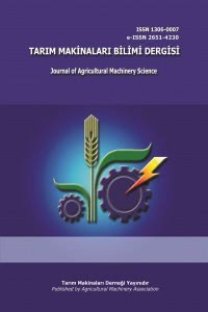Reliability Analysis of Combine Harvesters
Combine harvester, grain harvesting, reliability
Reliability Analysis of Combine Harvesters
___
- ASAE, (1994). ASAE Standards-Test and Reliability Guidelines, ASAE EP456. American Society of Agricultural Engineers. St. Joseph, MI. 49085-9659.
- Anonymous, S. (2008). Tarım Alet ve Makine Sayıları (Numbers of Agricultural Tools and Machines). (URL: http://www.tuik.gov.tr/bitkiselapp /tarimalet.zul). Latest Access: 12 June 2010
- Billinton R., R. N. Allan, (1992). Reliability Evaluation of Engineering Systems (Concepts and techniques). 453 pp. Plenum Press, New York, London.
- Bohm M., (1993). Breakdowns in Agricultural Tractors. Agricultural Engineer, Autumn 1993, p. 79-83.
- Calabro, S.R., (1962). Reliability Principles and Practises. 262 pp. McGraw-Hill Book Company, Inc.
- Hunt, D. (1983). Farm Power and Machinery Management. Iowa State University Press, p. 352.
- Kumar R., J. R. Gross, (1977). A Study of Combine Harvester Reliability. Transactions of the ASAE, 20(1):30-34.
- Laine A., M. Jarvenpaa, (1998). Reduction of Machine Costs on Finnish Farms by Extending the Operating Life of Tractors and Combine Harvesters. International Conference on Agricultural Engineering. Part 1, pp.471-472. Oslo 24-27 August 1998.
- Say, S.M., A. Işık, (1997). Tarım Makineleri İle Çalışmada Arızalanma Oranı ve Güvenilirlik Değerlerinin Belirlenmesi (Determination of Breakdowns Ratio and Reliability Values when working with Agricultural Machines). Tarımsal Mekanizasyon 17. Ulusal Kongresi Bildiri Kitabı (Book of Papers for 17th National Agricultural Mechanisation Congress): 130-137. 17-19 September, Tokat.
- Say, S.M. (2001). Biçerdöverle Hasatta Biçerdöver Çalışma Güvenilirliğinin Belirlenmesi ve Park Planlaması Üzerinde Bir Araştırma (A Research Study on Determination of Harvester Reliability in Harvesting and Park Planning). Ç.Ü. FBE, Doctoral Thesis, 157 pages.
- Tufts, R.A. (1985). Failure Cause, Frequency, and Repair for Forest Harvesting Equipment. Transaction of the ASAE 28 (4):1673-1677. Ward S.M., M.B. Cunney, P.B. McNulty, (1985). Repair Costs and Reliability of Silage Mechanisation Systems. Transaction of the ASAE 28 (3):722-725.
- Weibull, W., (1951). A Statistical Distribution Functions of Wide Applicability. Journal of Applied Mechanics, 18:293-297.
- ISSN: 1306-0007
- Yayın Aralığı: 4
- Başlangıç: 2005
- Yayıncı: Tarım Makinaları Derneği
Investigation of the Performance and Emission Values of Non-Standard Fuels at Diesel Engines
Tanzer ERYILMAZ, Hüseyin ÖĞÜT, Hidayet OĞUZ, Seda BACAK
Examination of fuel properties of biodisel which obtained from terebinth oil and blending
Ayşe Betül BALCI, Hakan Okyay MENGEŞ
Examination of Fuel Properties of Biodiesel Which Obtained from Terebinth Oil and Blending
Ayşe Betül BALCI, Hakan Okyay MENGEŞ
Durmuş KAYA, Kamil EKİNCİ, Osman YALDIZ, H. İbrahim SARAÇ, Berk KÜÇÜKKARA, Günnur KOÇAR
2010 Cilt 6 Sayı 1 Bilimsel Danışma Kurulu ve Hakemleri
(2010 Volume 6 Number 1 Scientific Advis REFEREES)
Determination of Flue Gas Emission Values of Cotton and Sesame Stalk Briquettes
Osman YALDIZ, Durmuş KAYA, H. İbrahim SARAÇ, Kamil EKİNCİ, Günnur KOÇAR, Berk KÜÇÜKKARA
Füsun Hastürk ŞAHİN, Poyraz ÜLGER, Türkan AKTAŞ, Hülya ORAK
